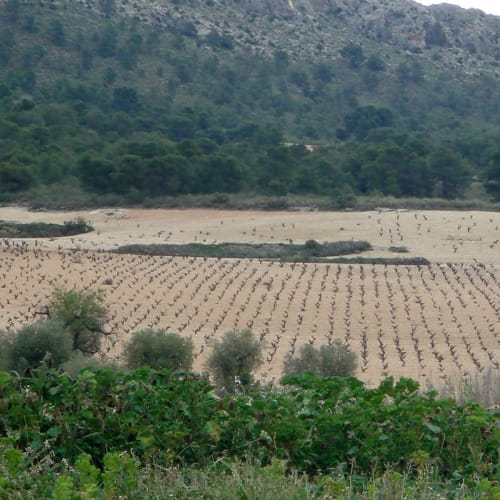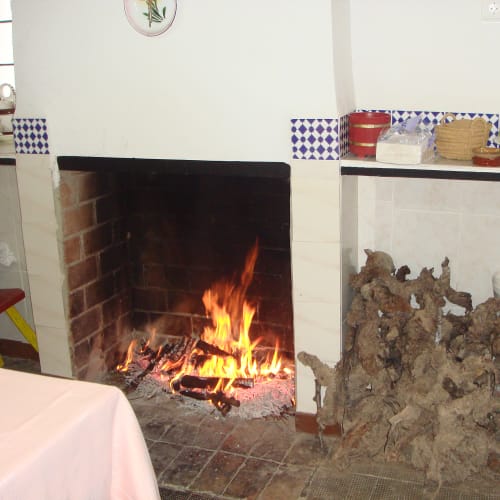Three Kings Sale - Up to 40% Off! Shop Sale
Spain's 'Hottest' Wine Region
September 2007




Last spring my wife Ruth and I met three men who produce remarkable products near the remote mountain town of Jumilla, located in a coastal mountain range in northern Murcia. The mountains are about a half a mile above the Mediterranean port of Alicante.
As we approached the area, we saw the haunting image of gnarled and blackened grape vines dotting the hillsides: each of them struggling to find life-giving water. Every day the vines face adversity due to the extremes of the arid mountain climate. The grapes bake in the summer sun and hunker down for the cold nights. Yet, under the stony surface of the vineyards, their roots draw moisture from shallow chalky soil on a bed of limestone that absorb the scarce rainfall.

Many of these plants have lived for nearly eighty years in this harsh environment. All year long, dedicated vintners tend the vines by hand. The grapes remain on the vine until they have reached their absolute ripeness, and then they are gathered and sorted by hand before they are pressed. They are the source of remarkable wines.
These gnarled vines are emblematic of strength and resilience. I am referring both to the grape vines and to the families who cultivate them. Miguél Gil, owner of one of the bodegas greeted us cordially when we arrived in Jumilla. His cousin Lorenzo and his neighbor Juan Molino accompanied him. In his dignified, unassuming way, Miguél embodied the traditional hospitality of Spain.
Miguel graciously invited us to join him, his wife Marisu and their young son Miguél for lunch featuring the best rice dish in the world. We drove to a modest restaurant named Paco Gandía in an inconsequential town - one of those unpretentious places that only food lovers know about.
There, in a small room overflowing with delighted Spaniards, we were served "the best rice in the world". It was made of rabbit and fresh local snails simmered in a bed of Calasparra rice, saffron and spices. As I looked over to the open kitchen, I could see a stone hearth fueled by dried clippings from the vineyard. Over the crackling flames was our delicious fare simmering in a paella pan. It seemed to be a cross between my understanding of a paella and arroz a banda. It was the best.
Later, Ruth and I walked the land with Miguel, seeing those valiant gnarled vines and visiting his family bodegas, which were a balance between tradition and artful technology - which produces extraordinary wine such as Clio and Juan Gil.
During our walk together, Miguél stopped by a container filled with items that had been cleared from his father's office years ago: the first electric typewriter in town, elaborate American short wave radios, etc., signs of an imaginative and progressive man. However, before he could reach his prime Juan suffered an untimely death - leaving his grieving wife to raise their nine children.
With heroism and determination, she nurtured a very close family through the aftermath of the horrifying Civil War followed by the hunger and deprivations of World War II and beyond. A tribute to her strength and character as a mother is that even now her sons and their families maintain intimate ties with one another. The younger brothers are working side by side to produce some of the most noteworthy wine in the region. The sons named their bodega Hijos de Juan Gil after their beloved father. He would have been so proud.
The second person we met was José María Roch -- another man of great integrity. As we stood outside his centuries-old finca, he pointed out his various vineyards planted on the hills in such a way as to take advantage of the microclimate. José María cultivates his family's vineyard Julia Roch y Hijos traditionally and naturally. He uses no irrigation and a minimal use of chemical products.

He spoke to me fondly of the venerable vines that were growing just at our feet, and showed us the family's traditional bodega. At the dinner table, José María told me that when as a youth, he chose to work with the land, his brothers questioned his judgment – they chose technical careers in the modern economy. Now, he said with a sense of pride, they appreciate his wisdom – for through his labor the family is now producing Casa Castillo, an internationally celebrated wine.
Juan Molina was the third man of Jumilla with whom we spent time. He is the fifth generation to operate a ranch called Casa Pareja. He does not produce wine, but rather olive oil and fruit. Juan drove us throughout his 800-acre holdings. A nursing field dog decided to join our excursion (with her puppies tagging along) as we drove slowly by the groves of organically raised olive trees nurtured from olive pits. Ruth and I marveled at the way row upon row of old olive trees seemed to be prospering even though their trunks arose from a seeming bed of stone! Some of the trees were ancient – surely older than any of the grape vines in the area.
We stopped at a cluster of small buildings, where within the patio Juan proudly showed us the olive press of his grandfather. He fondly recalled that as a little boy he would be at his grandfather's side watching the olives arrive from the groves and be pressed the traditional way: a mulch of the ripe fruit was sandwiched between discs of woven esparto grass and pressed until the olive oil flowed.
Juan ushered us through a formidable oak door that he had rescued from an abandoned monastery. In the corner of the next room sat a magnificent desk, entirely hand carved and fitted from olive wood. It was at that desk where he, his father and his father's father transacted the family enterprise.
Juan is completely committed to the concept of traditional natural farming in all aspects, even though Jumilla is an inhospitable climate. He has even found a way to mix his olive pits with manure in order to produce fuel!
Juan's approach to cultivating the soil is not easy – in fact, life had not been easy for him and his family. Nevertheless, he is convinced that it is the right thing to do. He was an organic farmer before the term became fashionable. I could sense the pride he felt in his life's work as he asked Ruth and me to sample his freshly pressed olive oil.
After two extraordinary days, we left Jumilla with a deep appreciation of our hosts: the fruit of their labor – the gnarled vines and olive trees and the treasured products they produced witnessed to resilience, determination, and grace - all qualities that create these remarkable men of Jumilla.
Tu amigo,
Don

